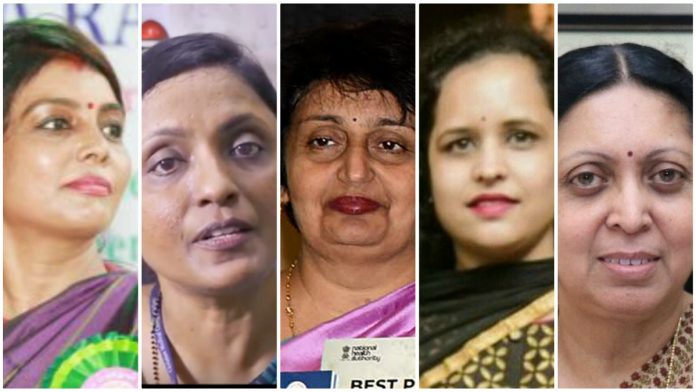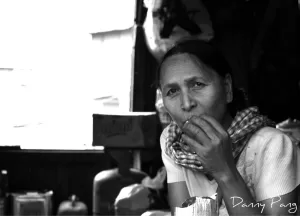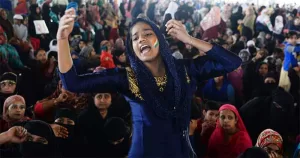Mantasha Ansari
In political science, we are taught that the private sector creates jobs and prosperity for people. At least during the Coronavirus epidemic, it has become clear that the private sector is of no help. And in the state sector, it is the women who are at the forefront of the fight against the epidemic. Notably, it is the Anganwadi and Asha (Accredited Social Health Activist) workers who are out doing survey of people in the areas affected by the virus, visiting door to door, noting down your fever, cough and sneeze, and at great risk to themselves and their family members.
In this epidemic, these female workers are the real foot soldiers in the government’s fight against the deadly disease. Their salaries are around Rs 10,000 per month in different states, not enough to feed a family of four. There are 1.3 million Anganwadi workers engaged in child nutrition and pre-primary education in India. Asha workers, whose strength is estimated at one million, are community health workers. It is on them, not the private sector, that the government is relying to ensure contact tracing and reporting of people affected by the Coronavirus.
When private doctors have mostly closed offices, these women are doing their job despite personal risk. Consider the case of Omana, an Asha worker in Thiruvananthapuram, Kerala. As per a report, Omana visits 33 houses on foot every day, ensuring that people are following social isolation rules or quarantine, giving paracetamol to children, checking on pregnant women if they need medicine, and so on. Not only in India, but in the U.S. too, it is women who are delivering “essential services” during this epidemic. On April 18, the New York Times reported that one in three essential work is being done by women, whether nursing the sick or selling groceries.
In India, Odisha was first state to order complete lockdown of major cities like Bhubaneswar on March 12. The state government has depended on the Asha, Anganwadi and SHG (self-help groups) workers in the fight against the Coronavirus. As per a report dated April 11, around 605 SHGs made 15 lakh cotton facemasks, while more than 7,000 SHGs are working day and night to produce protection gear for nurses and doctors on the frontlines. Additionally, over 6,700 women employees are managing 5,247 panchayat-level free kitchens for the poor.
A citizen is one who stands by another citizen. In these difficult times, women are understanding their duties and standing with other citizens. This is the true meaning of citizenship and the way these women are performing duties tells us that the state belongs to us. The reason women emerged as foot soldiers is also because the World Bank has aided the SHG (self-help groups) movement over the past two decades. The SHG movement empowers poor rural women through small savings and credit groups, with 67 million Indian women now members of six million SHGs.
On April 11, the World Bank said in a report that women associated with SHGs are at the forefront of the fight against the Coronavirus, noting: “In over 90 percent of India’s districts, away from the limelight of cities, SHG women are producing facemasks, running community kitchens, delivering essential food supplies, sensitizing people about health and hygiene, and combating misinformation.” Across India, women of SHGs have produced 19 million masks and have set up 10,000 community kitchens to feed the poor and stranded migrant workers.
On the one hand, the country is burning in religious hatred. Social media is full of how Muslims are being discriminated by rightwing Hindus. On the other hand, women, irrespective of religious or caste barriers, are writing history and setting examples for our future generations. They are uniting themselves and fighting together in this epidemic. Today when people are forgetting the meaning of togetherness, women are giving a real meaning to what citizenship is. Women of every social sector are playing a major role in this pandemic.
At a shelter in Nungambakkam, homeless and differently abled women decided to do their bit to fight the epidemic, stitching facemasks from reusable fabrics for the sanitary workers of Chennai Corporation. One of the women told NDTV: “The government has given this shelter to us. During this time of pandemic, we decided to do something for the government and started making face masks for the sanitary workers of Chennai. In one day, we make about 200-300 face masks, we are following all the necessary guidelines like social distancing.”
Many prominent women are at the heart of the fight against the pandemic. Dr. Nivedita Gupta, a senior scientist at Indian Council of Medical Research, is engaged in designing testing and treatment protocols. Dr. Renu Swarup, secretary of the Department of Biotechnology, is leading efforts to find a vaccine. Dr. Priya Abraham, director of the National Institute of Virology (NIV) in Pune, successfully isolated the deadly Coronavirus. Pune-based virologist Minal Dakhava Bhosale gave India its very first Coronavirus testing kit. On March 18, a day before delivering her baby, she submitted the kit for evaluation to the NIV. These are stories of heroism that destroy patriarchy and demolish stereotypes about the modern woman.
In crises like the Coronavirus, we want our government to be give us timely information. The government must be more answerable in such times. Beela Rajesh, the health secretary of Tamil Nadu, emerged as a key troubleshooter against the epidemic, addressing media queries, visiting hospitals and updating information on Twitter. Every crisis gives birth to warriors. In this pandemic, women are clearly leading the way, including female journalists who go out in the field despite the threat. Two female journalists of The Print – Swagata Yadavar and Manisha Mondal –were first to go into Bhilwara, the first district to be sealed before the national lockdown.
Globally, the Washington Post reported on April 20 that female leaders are being hailed as voices of reason in the fight against the Coronavirus. It listed German Chancellor Angela Merkel for empathetic and logical approach, New Zealand Prime Minister Jacinda Ardern for her confusion-less decisions, Norwegian Prime Minister Erna Solberg for allowing scientists to take the lead on medical response, Prime Minister Katrín Jakobsdóttir of Iceland for ensuring that anyone who wants tested is tested, and President Tsai Ing-wen of Taiwan for early assertive measures in health checks. Women’s success might also be due to empathy that comes naturally to them.
The argument here is not that men are not engaged in this battle against the epidemic. In a highly patriarchal society like ours where girls are not even expected to go alone for a movie, it is natural that men occupy all occupations. It is men who are electricians, drivers, chefs, barbers, even sellers of women’s undergarments in shops, and so on. The argument is this: women are at the frontline in this epidemic despite personal risks, even though they are poorly paid. In India, there is space for more women at the top – whether in politics, corporate or government sector. Our country will prosper only when women are decision makers.
(Mantasha Ansari is a student of BA Hons in Political Science at the University of Lucknow.)
***
Here is another inspiring article related to this theme:
Naba Kishor Pujari writes, in an article titled: Tribal Women of Odisha’s Sundergarh District Turn Good Samaritans in tackling COVID 19
Despite carrying their lives in the simplest circumstances and harder struggles, 12 tribal women groups of rural Sundergarh stepped out to serve people in these trying times, thanks to their indomitable spirits.
As the Statewide lockdown has been stringently imposed thrashing normal life in Odisha, these women in Sundergarh emerged as Good Samaritans as they produce face-masks for the poor and spreading awareness on the impact of COVID 19 in 3 Gram Panchayats of Subdega block in Sundergarh district of Odisha.
All these women are associated with the Mahila Sangram Samiti, Sundergarh, a people’s collective that works for the socio-economic and political empowerment of the marginalized communities and especially for women in Sundergarh.
The Gram Panchayats like Kiralaga, Karamdihi and Kurumkel of Subdega block are located in remote areas and there was a scarcity of masks as against the demand.
“We realized that drugstores were overpricing face masks which are essential for the safety against the rampaging COVID19 pandemic and that too were not available nearby. That’s what made us to thought of making face-masks for those who cannot buy it,” said Linen Kerketta.
It was our team members of the organization who encouraged for this noble initiative. We know tailoring and therefore, we decided that we will do our bit until they receive help from the government,” said Ashiyani Tete, whom herself has already made 100 masks and distributed in her Gram Panchayat.
Sundergarh is a tribal-dominated (more than 50 per cent are tribals) district and a Below Poverty Line (BPL) Census conducted by Odisha’s Panchayati Raj department enumerates about 65 per cent of the population in Sundargarh district to be BPL.
Incidentally, as the Bisra town of this district has been shut down by the district administration after two residents of the area were tested positive for COVID-19 in the last week, the fear among people rose.
There was a lack of an adequate quantity of protective gear to tackle the deadly coronavirus. At the same time, it was also important for the people to wear masks as it can play crucial in tackling the COVID-19 pandemic. So, these women could not wait to produce face-masks and distributed around 500 masks in these 3 Gram Panchayats initially. They are also planning to make another 1000 masks to meet the need of more people as the lockdown was extended till 3rd May.
However, it was not easy though for these women to be where there are now today. As the lock-down declared, getting the raw materials for making masks was an arduous task. However, there was no looking back option left for them. So, they decided that they will donate their new “Sarees”, to make these masks!




